| Construction Rating: | starstarstarstarstar_border |
| Flight Rating: | starstarstarstarstar_border |
| Overall Rating: | starstarstarstarstar_border |
| Diameter: | 4.00 inches |
| Length: | 28.50 inches |
| Manufacturer: | Madcow Rocketry  |
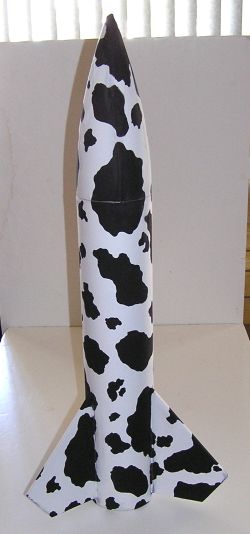
Brief:
This is a nice entry level mid/high power kit. Large tube, lots of room for recovery gear, simple build, and a great
flier.
Construction:
The main components consist of high quality parts and is a very complete kit!
- 4" nose cone
- 4" body tube
- 3 1/4" ply precut fins
- 2 3/16" centering rings
- 8" length of 38 MM motor tube
- short length of 1/4" launch lug
- 15' of 1/2" tubular nylon for shock cord
- Nomex® shield
- 36" ripstop nylon chute
- hardware
Although this is the type of kit I normally do not purchase, I was the lucky winner of it at a local rocket meet as a door prize. However, after opening the kit and inspecting the parts, I realized that it was a very complete and well thought out package. The only items not included were attachment links for the shock cord and some kind of positive motor retention. Since motor retention is a personal matter and the links would only add unnecessary weight to the kit, this was not a problem for me as I have plenty of both items on hand. If you are going to be building a few larger rockets, it would be a good idea to stock up on these items.
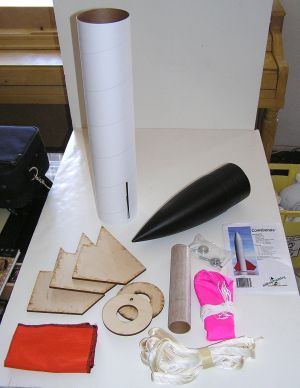 The instructions were easy to follow with many good pictures of the build and pictures tell
a better story of what to do. This is a great kit for the Level 1 attempt and could also be used with the larger L2
motors with proper balancing.
The instructions were easy to follow with many good pictures of the build and pictures tell
a better story of what to do. This is a great kit for the Level 1 attempt and could also be used with the larger L2
motors with proper balancing.
It is solid as a tank without the excess weight and when built right, it will be around for many, many flights.
Construction starts with the motor mount and is as simple as can be. However, see below for the extra steps that I do to make it very strong. After adding two T-nuts to one ring for motor retention, rough up the motor tube with 60 grit sandpaper for better glue adhesion and mark the tube for the rings. Two centering rings on opposite sides of the motor tube, a little epoxy and that's it. Add the shock cord eyelet as instructed and the motor mount is finished. The only addition I did here was to use a closed eyelet. I have a bunch that were welded closed for me and they are better to keep all the recovery gear on the rocket. Although the bent eyelet seems to be quite strong, they have been known to open up.
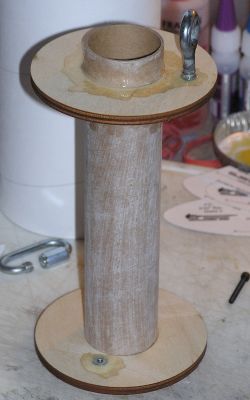
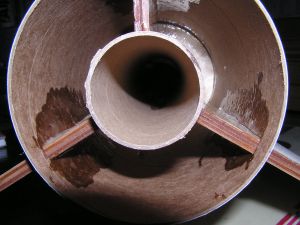
Since the body tube was nice and large, I did not attach the shock cord to the eyelet before gluing the motor mount into the body tube. After a test fit I could easily get my hand inside to attach a quick link with the cord. While the mount was test fitted inside, I marked the location of the upper ring, pulled the whole thing out and added epoxy to the proper locations and slid the assembly back into its finished position. I made sure the fin slots were clear of the CRs. I usually like my fins to butt up to the centering rings for added strength and was thinking of adding a third ring to do this, but I decided to just build this one as the kit calls for. I wasn't planning on ripping this one with large motors so stock was going to work fine.
As the pictures show, I do my centering rings a little differently! I only glued the upper ring to the motor tube at first. Once that has set up, I screw two bolts into the T-nuts, place epoxy at the upper ring mark in the tube, slide the lower CR onto the motor tube WITHOUT GLUE and slide the assembly into the body tube. This way the motor tube is properly centered in the body and when the upper ring has set up, the lower ring can be removed. You now have access to the bottom of the upper ring and can add internal fillets to the fins and upper CR. The internal fillets add very little weight and an immense amount of strength!
For all the internal joints and fillets, I used 30 minute epoxy and the outside fillets were done with Titebond II.
While the motor mount upper CR was setting up, I did a little sanding on the fins. Normally I will give them a good airfoil shape to aid the aerodynamics but this rocket was not being built for performance so a fairly good rounding of the leading edge and a quick, light sanding of the surfaces was enough. I test fit the fins through the body tube slots and very little to no sanding was need to get them in.
After the upper ring set up and the lower one removed, the fins were glued on. Epoxy was placed only on the lower part of the fin tab and the area of the fin that touches the outside of the body tube. Make sure the fins are perpendicular to the body as they set up. After all the fins are attached and the glue set up, remove the lower CR and you now can get inside the body to add the internal fillets. Give all of the attachment points a good coating of epoxy but you don't have to glob it on. Get some on the lower part of the upper CR as well. As the epoxy soaks into the tube and the wood, it will make a very strong joint that really needs nothing else to hold the bottom of the rocket together with most of the HP motors out there.
Once the internal fillets are dry, epoxy on the lower centering ring. I added wood glue fillets to the fin/body joint and to the bottom of the lower centering ring. Mark the location for the launch lugs and epoxy them onto the main tube.
A closed eyelet was epoxied into the nose cone and when that was dry the recovery gear was attached to the rocket. You will need to add loops to the end of the shock cord or just tie it off to a quick link, and it wouldn't hurt to put a shock cord protector on the lower portion to keep it from melting from the ejection charge unless you are real good at getting the chute protector all the way down to the motor mount tube with everything inside of the protector.
There were no "gotchas" or alignment issues I found with this kit and I was very pleased at the ease of the build. All up, except for glue drying time, it should take about an hour to build this one nice.
Finishing:
Finishing this one was interesting to say the least! Being as it was a Madcow kit and was called the Cowabunga, I
obviously needed to keep it farm inspired. After considering the paint scheme for a cow, I thought it would be very
cool to replicate a cow hide!
I remembered some material from many years ago called "flocking" that was used for the interiors of model cars. I could have sworn I had some from then but was unable to find it. A trip and inquiry at the local hobby shop was fruitful as the owner was able to order some of the material from Testors! However, once it came in, it was clear that it was not going to give me what I wanted. First the material was almost a powder, not strands, and it came in 1/2oz amounts for about $5 a package. At that rate, I was going to need about $50 just for the finish.
On to plan B. I looked and looked for some thin cowhide but again that was a no go and I am in Phoenix, AZ. Regular hide would have added over ten pounds to the rocket and that was if I could get it to stay on the thing.
Plan C came about with a chance question to a wonderful sales lady at the local Hobby Lobby. I asked if there was anything that looked like cow hide in cloth and she pointed right to it! A few dollars later, I had two yards of the stuff, some spray glue and the big question of how I was supposed to get this onto the rocket smoothly and evenly.
I made some cutting patterns with craft paper and when they looked like they would work, got to the real thing. The body tube and fins came out great but the nose cone gave me enough fits that I finally just slapped the stuff on it and it was done. All loose edges were put down with thin CA and some touch ups were done with a black Sharpie. It passed the three foot rule just fine!!
This was a very nice kit to build and finishing would be no problem if something simpler was done unlike mine. You will need some small extra parts and pieces to finish it.
Construction Rating: 4 out of 5
Flight:
First flight was out on the SSS wide open range. A H123-M was loaded up and everything packed for recovery. Boost was
fast, nice, and straight, and the chute came out just a bit before apogee. Great flight to about 1500' and everything
looked good.
The only problem, if that, is motor selection. There is none! Good rocket science and knowledge is needed to make the right choices, but with care and maybe RockSim, it is not that hard to do. Personally, I think this thing could take any motor you throw at it and go like an Energizer bunny!!
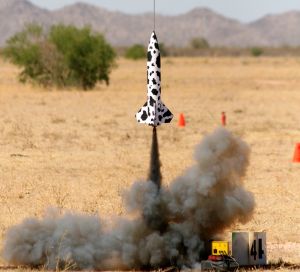
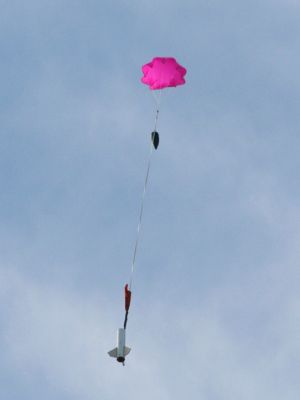
Recovery:
Landing speed looked about right and although landing on the hard desert ground, everything was just great. The only
problem was the dust on the cloth! How the heck am I supposed to clean this? In the washer/dryer?! What was I
thinking!! However, the looks and laughs from the spectators and the RSO was all the reason I needed!
Flight Rating: 4 out of 5
Summary:
I am not a great fan of 3FNC rockets myself, but as a gift I will do my best to make a great rocket out of them. This
one is very nice! It would be excellent for a Level 1 attempt. The kit is very complete, easy to understand and build
and will fly with the best of them.
Overall Rating: 4 out of 5
 |
 |
Flights
 |
 |
Sponsored Ads
 |
 |












J.Z. (January 11, 2009)